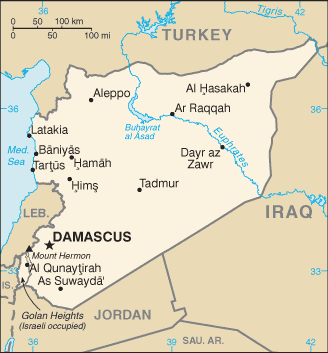.
.
.
A Skeptical Eye: Saudi King Condemns Syrian Crackdown
Demands for 'Comprehensive Reforms' Ring Hollow After Role in Bahrain Attack
As the massacres in Syria get bigger and more frequent — one today killed 59 in an eastern city — a number of factions the world over have turned against the Assad regime on the matter, with everyone from the Vatican to the Arab League calling for an immediate end to the violence. The latest came today, when the Saudi King demanded “comprehensive reforms” in the Ba’athist country.
 Taken at face value the comments seem fairly uncontroversial, a simple rehash of what most other nations are saying now. Saudi Arabia, however, is not just any nation but is a regional power which has acted with utmost cynicism with regard to the Arab Spring revolts.
Taken at face value the comments seem fairly uncontroversial, a simple rehash of what most other nations are saying now. Saudi Arabia, however, is not just any nation but is a regional power which has acted with utmost cynicism with regard to the Arab Spring revolts.
Having eagerly taken in the first dictator ousted by protests, Zine el-Abidine bin Ali of Tunisia, the Saudi government followed up with an invasion of Bahrain to violently put down pro-democracy rallies there, while taking a very Syrian tack in their own crackdown on protesters in Qatf. Mass arrests and accusations of “sedition” were and are the order of the day for reformists within the Saudi Kingdom, and it eagerly facilitates crackdowns by neighboring regimes.
The difference, then, lies in Syria’s precarious position in Middle East power struggles. The Assad regime is Shi’ite (Alawite, Alevis...which explains its closeness to Shia Iran), albeit in a largely Sunni country. This would put it in the same position as the Sunni Bahraini royal family on that mostly Shi’ite island, but Saudi Arabia, which still envisions itself as a “defender of the faith” in sort of a 16th century Holy Roman Empire way, is more than willing to cynically hold a double standard if it means getting one up on the Shi’ites of the region.
Of course backing the protesters is also a recognition of the reality that the protest movement is growing by leaps and bounds despite of, and in many cases because of, the violent crackdowns. The US also jumped on the protester bandwagon a few months in (and reiterated their stance today), as did al-Qaeda’s new leader Ayman al-Zawahiri. Though the Assad regime still exudes confidence about its position, it seems that the knee-jerk moves toward heavy-handed violence reveal a growing fear that the pro-democracy movement is simply growing too big to stop.